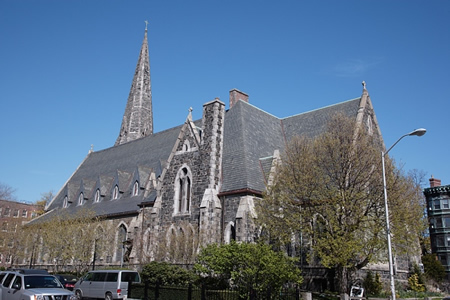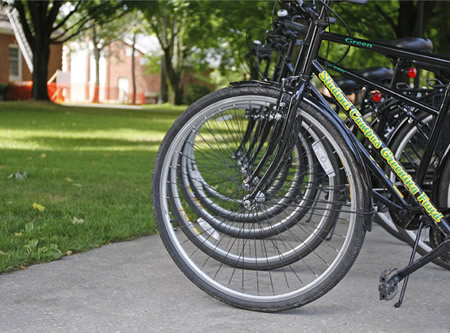« World's Longest Catwalk in Copenhagen, Denmark | Main | 2011 Jeep Wrangler: Coming Soon »
August 19, 2010
Best Colleges in the USA: U.S. News Media Group Announces the 2011 Edition of its Rankings


Photo: A Building at the Harvard University Campus.
• U.S. News Media Group has released the 2011 edition of Best Colleges, which includes rankings of more than 1,400 schools in the USA.
Harvard University is ranked No. 1 among Best National Universities, while Williams College tops the list of Best National Liberal Arts Colleges. The exclusive rankings, available online today at USNews.com, will also be published in the September issue of U.S. News & World Report, on newsstands starting August 31.
Over the past two decades, the U.S. News college rankings, which group schools based on categories created by the Carnegie Foundation for the Advancement of Teaching, has grown to be a comprehensive research tool for students and parents considering higher education opportunities.
"As soaring college costs make the decision more complicated than ever, U.S. News strives to provide students and families with the best information to help guide them through this process," said U.S. News & World Report Editor Brian Kelly. "This year the challenge comes down to finding the right college--at a cost you can afford. The 2011 edition includes specialty rankings, online guides for admission and paying for college advice to help navigate your search."

• Top 5 U.S. National Universities
1. Harvard University (MA)
2. Princeton University (NJ)
3. Yale University (CT)
4. Columbia University (NY)
5. Stanford University (CA)
• Top 5 U.S. National Liberal Arts Colleges
1. Williams College (MA)
2. Amherst College (MA)
3. Swarthmore College (PA)
4. Middlebury College (VT)
4. Wellesley College (MA)
The 2011 Best Colleges feature the established rankings of the Best National Universities and Best National Liberal Arts Colleges, while also including rankings of A+ Schools for B Students, Great Schools at Great Prices, and Up-and-Coming Schools, among others.
• The 2011 Best Colleges package provides an examination of how more than 1,400 accredited four-year schools compare on a set of up to 16 widely accepted indicators of excellence.
Among the many factors weighed in determining the rankings, the key measures of quality are: peer assessment, graduation and retention rates, faculty resources, student selectivity, financial resources, alumni giving, and for National Universities and National Liberal Art Colleges "graduation rate performance" and high school counselor ratings of colleges.
According to U.S. News, it has made some significant changes to the 2011 Best Colleges' ranking methodology and presentation.

Photo: Free "green bikes" parked at Green Mountain College in Poultney, Vermont.
• Meanwhile, responding to some dissatisfaction with traditional college rankings and the growing demand for universities to refocus on undergraduate education and value, the American Council of Trustees and Alumni (ACTA) unveiled today its 2011 college evaluations on WhatWillTheyLearn.com.
According to ACTA, its rankings grade more than 700 universities on education -- not reputation.
The free website evaluates more than 700 colleges and universities based on their general education curricula: the core courses aimed at providing a strong foundation of knowledge.
The website assigns each institution a grade from "A" to "F" based on how many of the following seven core subjects it requires: Composition, Mathematics, Science, Economics, Foreign Language, Literature, and American Government or History.
"The crisis in higher education is about more than money - it's about what we are paying for. And when it comes to ensuring graduates possess the basic skills and knowledge they need to succeed, universities are shortchanging students," said ACTA president Anne D. Neal, speaking at the National Press Club.

Photo: College student Stephanie Sequeira, right, buys herself a MacBook Pro while holiday shopping with her friend, Gillian Walsworth, center, at the Apple Store San Francisco. (Foto © Apple)
Key ACTA Findings:
• Colleges and universities have by and large abandoned a coherent content-rich general education curriculum, thereby allowing students to graduate with important gaps in their knowledge:
• More than 60% of all institutions receive a "C" or worse for requiring 3 or fewer subjects.
• Nearly 40% don't require college-level mathematics.
• Less than 5% of colleges and universities require economics.
• Less than a third require intermediate-level foreign language, a broad survey class in American government or history, or literature.

• ACTA concludes that universities have on the whole abdicated their responsibility to direct students to the most important subjects they will need for success after graduation, while continuing to charge a premium. A published report aggregating the data for the more than 700 schools will be sent to trustees of the institutions covered, as well as to the Governors and educational policymakers in the states.
• The American Council of Trustees and Alumni (ACTA) is an independent non-profit dedicated to academic freedom, academic quality, and accountability, while the U.S. News Media Group is a multi-platform publisher of news analysis, research and rankings which includes the monthly U.S. News & World Report magazine.
|GlobalGiants.Com|







Edited & Posted by the Editor | 6:53 AM | Link to this Post







